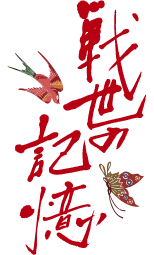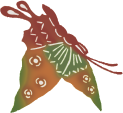
“War experiences in Kunigami and Ohgimi, north of main island of Okinawa”
“War experiences in Kunigami and Ohgimi, north of main island of Okinawa”
Saneo Nakamura, 86 years old
(Place of birth: Yona, Kunigami Village, Okinawa Prefecture)
When I was a fourth grader, the war started. Although we had classes at our school for a while, as the war progressed we were forced to dig air-raid shelters and help increase the production of food. Additionally, we were supposed to gather the firewood used to prepare meals for the Japanese soldiers. On the days without service work, we were always training by stabbing the straw figures that looked like Franklin Roosevelt, the American president then, and Winston Churchill, the British prime minister then.
On the day of December 8, 1941, our lives changed completely. We were restricted to sing only military marching songs and what our teachers talked about was nothing but the war. We did the physical exercise called “kenkoku-taisou” (national foundation exercise) in the school yard and when the Japanese Army was successful in the Attack on Pearl Harbor, we cheered, yelling “Banzai, banzai!” while waving hand-made national flags. All the students marched in the town of Hentona, Kunigami Village waving the national flags and singing a military marching song. At the school, we were always told, “You boys, go to war and render distinguished military services!”, which, I believe, made us think that we wanted to be soldiers.
I remember that my mother and elder brother had a big fight. My elder brother volunteered for military service for the Navy and my mother strongly opposed the idea. However, my elder brother said, “If I did not go and fight, the country will lose the war.” He volunteered and was accepted when he was 16 years old; went to war when he was 17; and fell in battle when he was 18.
We received a notice that my elder brother was killed in battle on the day before the US Armed Forces landed on Okinawa. My mother kept crying throughout the day. The next day, April 1, US Armed Forces landed and although everyone in the village ran away, my mother crouched down in tears in front of our family Buddhist altar and did not move at all. While three of us, my brothers and I, were trembling in the air-raid shelter with fear that the Grumman planes would start dropping the bombs at any moment, we shouted in tears, “Mother, please come in the shelter!” but she did not make any movement at all and stayed crouched down in front of the altar. She told me after the war, “I would rather have been killed then by getting hit by a bomb.”
The US Armed Forces landed at Yomitan on April 1 and it was around April 12 when they came to attack Hentona, located in the north of the main island, I believe. All residents, including us, escaped into the mountains, but the American corps came into the mountains to carry out their mopping-up operation. Every single one of us hiding in the mountains was captured and taken down to the village. Since we all were taught back then that the American soldiers were far more dreadful than devils, we would have never come down to the village, but we were captured. If we had not been forcibly taken down to the village by the American soldiers, we would have starved to death. If we had not been forced to come down to the village, many of us would have died in the mountains after having suffered from starvation.
I have one thing which I still cannot forget.
After being taken down from the mountains, we were loaded on a truck and taken to Kijoka, Ohgimi Village first, then further to Takazato. There was a community center where I saw many evacuees. Among the evacuees, I found a four or five-year-old boy and a two or three-year-old girl who were crying loudly beside a woman lying on the floor with her face covered with a cloth. The middle-aged women standing beside them were trying to soothe them saying, “Don’t cry. Your mother is just sleeping. Don’t cry.” However, they knew that their mother was already dead and never stopped crying. What happened to us was tough, but I never can forget what I saw there. I am still worried about what has become of them. We should never fight wars.
Saneo Nakamura, 86 years old
(Place of birth: Yona, Kunigami Village, Okinawa Prefecture)
When I was a fourth grader, the war started. Although we had classes at our school for a while, as the war progressed we were forced to dig air-raid shelters and help increase the production of food. Additionally, we were supposed to gather the firewood used to prepare meals for the Japanese soldiers. On the days without service work, we were always training by stabbing the straw figures that looked like Franklin Roosevelt, the American president then, and Winston Churchill, the British prime minister then.
On the day of December 8, 1941, our lives changed completely. We were restricted to sing only military marching songs and what our teachers talked about was nothing but the war. We did the physical exercise called “kenkoku-taisou” (national foundation exercise) in the school yard and when the Japanese Army was successful in the Attack on Pearl Harbor, we cheered, yelling “Banzai, banzai!” while waving hand-made national flags. All the students marched in the town of Hentona, Kunigami Village waving the national flags and singing a military marching song. At the school, we were always told, “You boys, go to war and render distinguished military services!”, which, I believe, made us think that we wanted to be soldiers.
I remember that my mother and elder brother had a big fight. My elder brother volunteered for military service for the Navy and my mother strongly opposed the idea. However, my elder brother said, “If I did not go and fight, the country will lose the war.” He volunteered and was accepted when he was 16 years old; went to war when he was 17; and fell in battle when he was 18.
We received a notice that my elder brother was killed in battle on the day before the US Armed Forces landed on Okinawa. My mother kept crying throughout the day. The next day, April 1, US Armed Forces landed and although everyone in the village ran away, my mother crouched down in tears in front of our family Buddhist altar and did not move at all. While three of us, my brothers and I, were trembling in the air-raid shelter with fear that the Grumman planes would start dropping the bombs at any moment, we shouted in tears, “Mother, please come in the shelter!” but she did not make any movement at all and stayed crouched down in front of the altar. She told me after the war, “I would rather have been killed then by getting hit by a bomb.”
The US Armed Forces landed at Yomitan on April 1 and it was around April 12 when they came to attack Hentona, located in the north of the main island, I believe. All residents, including us, escaped into the mountains, but the American corps came into the mountains to carry out their mopping-up operation. Every single one of us hiding in the mountains was captured and taken down to the village. Since we all were taught back then that the American soldiers were far more dreadful than devils, we would have never come down to the village, but we were captured. If we had not been forcibly taken down to the village by the American soldiers, we would have starved to death. If we had not been forced to come down to the village, many of us would have died in the mountains after having suffered from starvation.
I have one thing which I still cannot forget.
After being taken down from the mountains, we were loaded on a truck and taken to Kijoka, Ohgimi Village first, then further to Takazato. There was a community center where I saw many evacuees. Among the evacuees, I found a four or five-year-old boy and a two or three-year-old girl who were crying loudly beside a woman lying on the floor with her face covered with a cloth. The middle-aged women standing beside them were trying to soothe them saying, “Don’t cry. Your mother is just sleeping. Don’t cry.” However, they knew that their mother was already dead and never stopped crying. What happened to us was tough, but I never can forget what I saw there. I am still worried about what has become of them. We should never fight wars.


